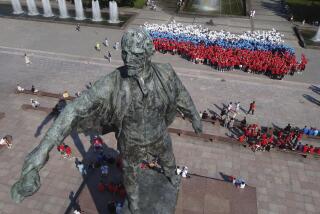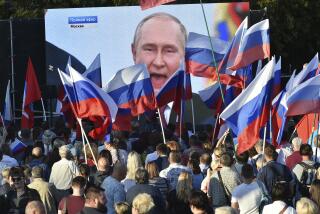PERSPECTIVE ON THE SOVIET UNION : Rossya Will Hollow Out the Empire : The election of Boris Yeltsin offers the hope of a peaceful solution, if not confederation then a friendly divorce.
- Share via
Nations can survive revolutions, centuries of foreign occupation and any number of partitions and still re-emerge intact because they are living cultural organisms.
Empires that rule over diverse nationalities have no such guarantee of survival. They are machines. Like all machinery, they need constant maintenance--first of all to suppress the natural separatism of the peoples they rule. Only the methods of control vary. From the Roman to the Soviet, empires have relied on very different combinations of repression and positive attraction, whether derived from imperial prestige, the appeal of the dominant culture, ideological loyalty or material incentives.
Under Josef Stalin, imperial control was more than sufficient. His repression was so effective that it pervaded every part of the Soviet Union. On top of that, both Russian culture and Communist ideology could still attract many non-Russians. Finally, the Soviet empire, poor as it was, offered important material incentives--the building of infrastructures for the backward Caucasian and Central Asian regions as a whole and individual rewards to the many non-Russians who were promoted into the party hierarchies both local and central. Hence, Stalin had no great difficulty in controlling the 14 ethnic socialist republics as well at the huge Russian Federation and the 19 autonomous republics, 10 autonomous regions and eight autonomous provinces within their borders. Armenians, Azeris, Byelorussians, Estonians, Georgians, Latvians, Lithuanians, “Moldavians” (that is Romanians), Kazakh, Kirgiz, Tadzhiks, Turkmens, Ukranians and Uzbeks as well as the Russians themselves and the many smaller nationalities all uniformly declaimed their devotion to Stalin, even if in their own languages.
Under Leonid Brezhnev, the regime’s repression was becoming insufficient to maintain the Kremlin’s control. Although imperial prestige was enhanced by the Soviet Union’s large role in world affairs, a slowing economy and a decaying ideology were rapidly reducing Mocow’s overall attraction for the nationalities. Yet the empire remained quite stable because Brezhnev skillfully compensated for the loss of centralized control by distributing real power to local ethnic leaders loyal to him as well as to the party. This loyalty was richly rewarded with both a luxurious standard of living and leadership positions guaranteed for life (“the stability of cadres”). Had its feudalization continued, the Soviet Union would eventually have come to resemble the Holy Roman Empire, with a Russian emperor in the Politburo, princes (first secretaries) in charge of the socialist republics, dukes in command of the autonomous regions and so on.
Under Mikhail Gorbachev, however, there is neither enough repression to maintain imperial control nor a functioning feudalism, because Brezhnev’s ethnic allies were dismissed from the start as inefficient and corrupt. The local Communist parties, already much weakened by corruption, were then taken over, or displaced, by nationalist movements. At the same time, the positive attractions of imperial prestige, Russian culture and the Leninist ideology have all vanished. Finally, the half-reforms of perestroika have replaced Brezhnev’s stagnating economy with one that has been declining into outright chaos, so that the empire can no longer offer any material incentives, either. When Gorbachev warned the Lithuanians that independence would impoverish them, they could only laugh; obviously it meant that Gorbachev simply did not know what was happening in Soviet factories, farms and shops--not even in the Gastronom food shop around the corner from the Kremlin.
With the Kremlin’s control thus totally insufficient, the machinery of the empire now survives by inertia and such feeble repression as still remains (the blockade of Lithuania, police actions in Central Asia, etc.)
True, with 145 million Russians at its core, the Soviet Union could survive by force alone, under a Russian nationalist-imperialist regime. Russian democrats have always known that “the Russian people can never be free if the empire remains the prison-house of peoples.” But of course, Russian democrats used to be few and powerless. Now, however, the election of Boris N. Yeltsin as president of the Supreme Soviet of the Russian Federation offers the hope of a peaceful solution--by the simple continuation of an administrative process that began long before his election. Ironically, the Russian dominance of the Soviet Union used to be affirmed by the absence of party and state organisms for the Russian Federation as such (because the Russians “owned” the entire empire anyway). Unlike all the other 14 socialist republics, the federation did not have its own party Politburo, nor a “republican” KGB or even an academy of sciences. Yeltsin now proposes to accelerate the administrative construction of Russian “sovereignty.” Because even conservatives support that goal, the formation of the new state called Rossya is now likely to progress very rapidly (with the liberals in the Moscow municipality providing the office space).
We may therefore witness the rapid hollowing out of the Soviet Union by Rossya, a process that could leave Gorbachev or his successors in charge of little more than the armed forces. The Russian Parliament has already voted to make its laws prevail over Soviet laws. And Yeltsin’s amicable meetings with the leaders of other national republics clearly suggest how he would handle their separatism, by negotiations leading to their membership in a truly voluntary confederation, or a friendly divorce. That is a far better prospect than the only other alternative, either a chaotic disintegration or a return to full-scale repression.
Of course there are many huge problems even with Yeltsin’s solution, including separatist tendencies within the Russian Federation itself. Its five autonomous provinces and 10 autonomous regions only have small ethnic populations, but the 16 autonomous republics are more substantial, with many having larger populations than many a member-state of the United Nations. How they react to the new Rossya remains to be seen, but some at least will not want to be ruled by Russians after decades of at least nominal equality in the Soviet Union.
More to Read
Sign up for Essential California
The most important California stories and recommendations in your inbox every morning.
You may occasionally receive promotional content from the Los Angeles Times.













